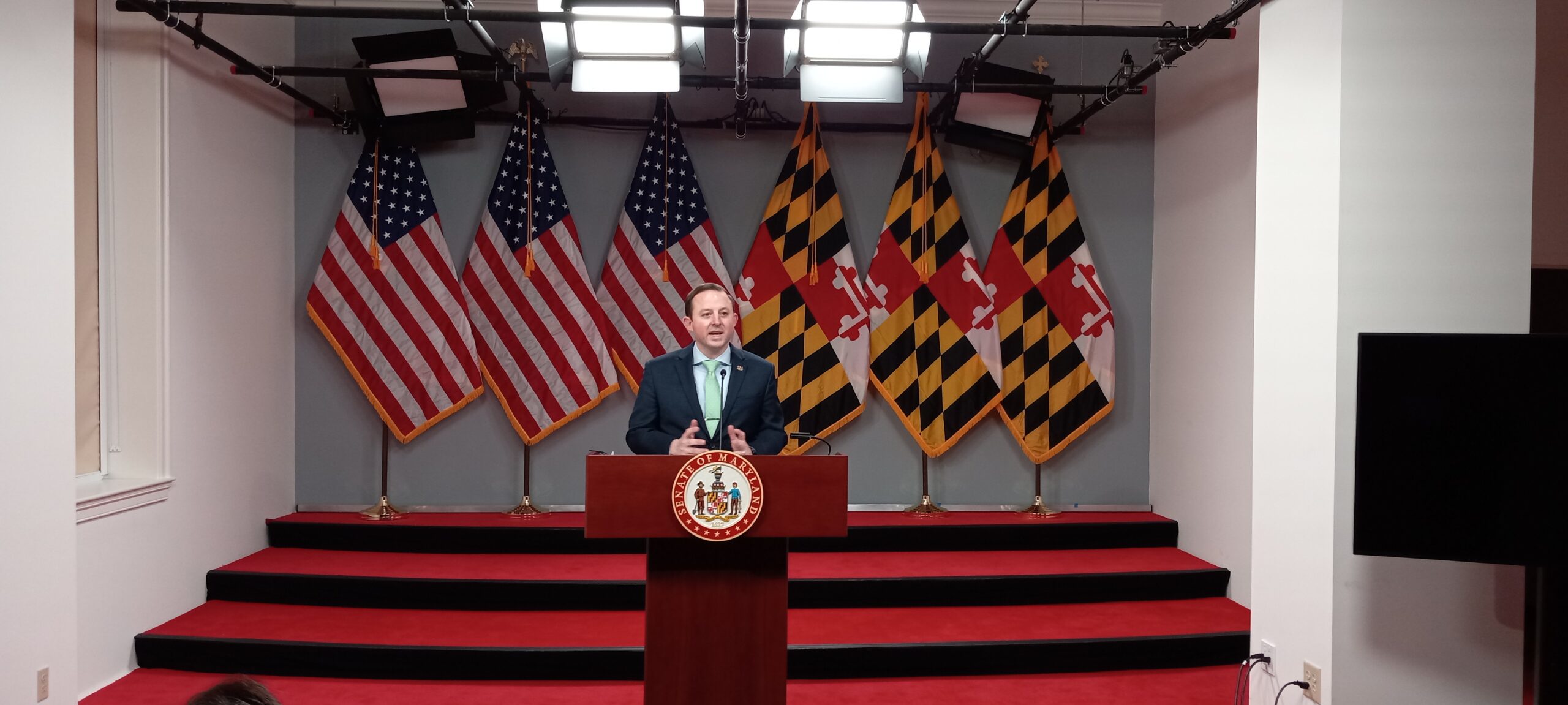Legislative Roundup: Ferguson Gives Assessment of Session So Far, Ghost Gun Bill Advances, and More

Senate President Bill Ferguson (D-Baltimore City) met the press on Friday, offering his assessment on where the General Assembly session is at a little past the halfway point. In general, he expressed satisfaction that the legislature is on track to meet its goals for improving Maryland’s health and economy as residents still struggle from the impacts of COVID-19.
Ferguson said the Senate was making “significant progress” on a comprehensive public safety package and was also poised to make “significant investments in Maryland’s child care system.” He predicted legislation to mandate paid family leave would pass both chambers of the legislature. And said he was pleased that his bill to expand the Maryland Corps Program, an AmeriCorps-type community service program for young adults, passed unanimously in the Senate this week, which he called a hopeful sign “as we look at the fraying gears of democracy.”
Ferguson said the Senate and House are moving closer to agreeing on a strategy for legalizing recreational cannabis, though he conceded that setting up a fall referendum for voters to consider putting legalization in the state constitution, as the House recently voted to do, “wouldn’t be my first choice.” But, he acknowledged, “This is what the legislative process looks like. You start somewhere and you meet in the middle.”
Ferguson spent a significant amount of time discussing anti-crime legislation.
“Crime is a top issue and, as we’ve said before here for several years, nothing else matters if people don’t feel safe,” he said.
Last month, Senate Democrats rolled out a package of public safety bills that take on criminal activity through prevention, intervention, criminal justice and rehabilitation.
Democrats have amended one of Republican Gov. Lawrence J. Hogan Jr.’s top legislative priorities, The Judicial Transparency Act of 2022, to fit with their approach.
As originally drafted, Senate Bill 392, would require a comprehensive annual report on the sentencing decisions by individual judges, including details on sentences outside of the Maryland Sentencing Guidelines. It was introduced as an emergency bill.
To the disappointment of Republicans, the bill hit the floor Thursday with amendments to remove its emergency status and aggregate the published sentencing data by county or circuit, so as not to single out individual judges.
The Hogan administration has introduced the bill in previous sessions, but it never made it to either chamber floor for debate.
Asked if he was concerned about how the bill will fare in the House, Ferguson said that transparency “in the administration of justice” is a “positive thing.”
“Hopefully the House sees fit that they agree this year,” he said.
The Hogan administration also reintroduced The Violent Firearms Offender Act of 2022, or Senate Bill 396, in an effort to impose longer sentences and create mandatory minimums for people convicted of multiple gun offenses.
The Violent Firearms Offender Act has been taken up in previous sessions, passing the Senate chamber twice. It has never made it out of the House.
Asked if Hogan’s gun bill is “dead,” Ferguson responded that “almost nothing is dead” at this point in the session but said he wants to see action from the House before committing to the legislation.
“I think before the Senate would take it up again, we want to see some movement on the other chamber so that we know that we’re not, sort of, throwing it into the wind,” Ferguson said.
The Senate president also was not shy in his criticism of Hogan’s approach.
“But look, I’ve said from the very beginning that The Violent Firearms [Offender] Bill … has good messaging around it,” said Ferguson. “Whether or not it actually impacts crime is an open question.”
Asked whether the legislature would pass significant tax relief during a session where the state budget surplus is $4.6 billion, Ferguson said lawmakers were continue to look at ways of taking advantage of the surplus without causing structural deficits a few years down the road.
“We can’t do something because this is an election year,” he said. “That will put us in trouble in three or four years.”
Ferguson said senators were very interested in using some of the surplus to set aside funding to pay for the Blueprint for Maryland’s Future, the expansive decade-long education reform plan. “That’s an important benefit for middle class Marylanders who send their children to public schools,” he said.
Asked about legislation to curtail the use by state officials of apps that automatically delete messages, Ferguson said legislative leaders weren’t making it a top priority, even though “transparency is an obvious objective for us in everything we do.” He side-stepped a question on whether he or other senators use any of these apps for official business, pointing out that “there are a number of different venues in which constituents contact us.”
Giving up the ghost
The House Judiciary Committee voted Friday afternoon to send a bill banning the sale and possession of ghost guns, or unserialized firearms, to the chamber floor.
Co-sponsored by Del. Lesley J. Lopez (D-Montgomery) and Sen. Susan C. Lee (D-Montgomery) on behalf of Attorney General Brian E. Frosh (D), the bill would ban sales of ghost guns beginning June 1, and ban possession beginning Jan. 1, 2023.
If enacted, violators are subject to a $10,000 fine or up to three years imprisonment.
Republicans argued the bill criminalizes gun ownership.
“I think having a criminal penalty just for owning one of these guns is terrible,” Del Robin L. Grammer (R-Baltimore County) said.
Del. Daniel L. Cox (R-Frederick) said that the prohibition on possession will “ensnare hundreds of thousands of Marylanders who make their own guns.”
Lopez rebutted, saying lawmakers considered the number of potential hobbyists in the state. She said there is a pathway for them to sell their handmade guns, whether in another state or by having them serialized in Maryland.
Cox retorted that hobbyists “don’t want the government tracking … their personal property like that.”
Cox then compared the notion that gunmakers would have to register their property with the government to the war in Ukraine.
“When you look at what’s going on in Ukraine, I think we see that … the whole world is cheering on citizenry taking up arms to defend themselves against a atrociously horrific regime coming in to attack them,” he said. “So this simply allows for bigger government to track and also entrap law-abiding people.”
Lopez suggested Cox should be wary of “comparing the United States government with the regime in Russia.”
The bill passed out of the committee with no amendments on a vote of 14-7.
Sticking with the union
The Senate passed a bill on Friday morning that brings Maryland public defenders one step closer to opt-in on collective bargaining.
Senate Bill 255, which passed out of the chamber generally along party lines, would allow lawyers at the Office of the Public Defender to choose to enter into collective bargaining agreements with the state over their pay, benefits and working conditions.
Under the bill, public defenders would also only be able to be disciplined or fired for just cause. Maryland public defenders are at-will employees, meaning they can be fired for any reason.
The Office of the Public Defender opposed the bill, saying it would reduce its ability to attract passionate, talented attorneys.
Sen. Edward R. Reilly (R-Anne Arundel) said that only three people have been let go from the Office of the Public Defender in the past three years.
“This is not an epidemic of people being released,” he said.
Sen. Pamela G. Beidle (D-Anne Arundel), the bill sponsor, said the state has seen vacancies and low wages for its employees over the past several years.
“How many have had to leave to make … a real salary in law firms?” she asked.
Sen. Jill P. Carter (D-Baltimore City) who years ago worked as an assistant public defender, used herself as a case study. When she began she was hired on a contractual basis and had to stay for two years to be eligible to receive benefits.
“That was something that wasn’t really sustainable,” Carter said.
The debate ultimately came down to spending.
Sen. Cory V. McCray (D-Baltimore City) is an electrician and union member. He also oversees the Senate Budget and Taxation Subcommittee on Public Safety, Transportation and Environment, where Chief Public Defender Paul DeWolfe acknowledged the office’s financial challenges during recent testimony.
Sen. Michael J. Hough (R-Frederick) asked if the agency would receive more funding if public defenders were granted the ability to bargain collectively.
Sen. Benjamin F. Kramer (D-Montgomery), who was defending the bill on the chamber floor, said he didn’t know.
“If you put more costs on the Office of the Public Defender and you don’t give them more money and put more requirements on them, you’re gonna have less public defenders — less people there,” Hough said. “It’s just simple math.”
Sen. Johnny Ray Salling (R-Baltimore County), who was in a union for over 30 years, broke away from his party, saying that working in unison with people with on-the-job experience affects change.
“I support this because I believe it’s the right thing to do to help this and it’s a good thing,” Salling said.
The bill passed out of the Senate on a vote of 30-14.
‘Where’s the beef?’ GOP asks of House tax relief bills
The House on Friday unanimously passed three tax relief bills — one to create a Maryland state match for the federal Work Opportunity Tax Credit, another to eliminate the state sales tax on oral hygiene products, and a third to create a sales tax exemption on diapers. But several Republicans used the votes to lecture Democrats on the need to pass more sweeping tax breaks — and one used the occasion to talk about abortion.
Republicans said the measures amounted to “election-year gimmicks” that didn’t amount to much.
“We should be giving all of Maryland families relief to their budgets and to our businesses,” said Del. April Rose (R-Carroll).
Rose was the first of a few Republicans who drew a rebuke from House Speaker Adrienne A. Jones (D-Baltimore County) for veering off-topic, when she started rattling off statistics about inflation rates in various sectors.
Del. Matt Morgan (R-St. Mary’s) said “it’s pretty obvious that we’re taxing our citizens too much,” but said he was pleased to vote for the diaper legislation. “I’ll take a tax cut for any reason, any excuse, under any circumstances possible.”
Ostensibly speaking in favor of the bill, Del. Mark N. Fisher (R-Calvert) asserted that “all life matters,” and then alluded to abortion rights legislation that the House Judiciary Committee was scheduled to vote on later in the day.
House Ways and Means Chair Vanessa Atterbeary (D-Howard), whose panel crafted the tax relief bills, jumped to her feet, suggesting that Fisher’s reference was out of order. Jones offered another admonition.
“There’s a correlation and everybody knows this,” Fisher replied. “No coincidence that this is on the floor now when we all knows what’s going to happen later.”
Del. Brooke E. Lierman (D-Baltimore City) urged her colleagues to support the legislation unconditionally.
“People on the other side of the aisle say, ‘I like this bill, but…’ I’m just going to say I love this bill. I am enthusiastically supporting this bill for any parent who has ever changed a diaper or ever will.”
When it came time to debate the oral products tax relief bill, Del. Kathy Szeliga (R-Baltimore County) said she hoped her colleagues had “brushed up on state tax policy.” She also joked that she had spoken recently to “my friend Clara at Burger King,” who looked at the tax relief proposals and wondered, “Where’s the beef?”
That was an apparent reference to Clara Peller, the octogenarian actress in a Wendy’s commercial in 1984 who famously uttered the “Where’s the beef?” line, which has become a political staple for suggesting a policy proposal doesn’t have much heft.
Masking policies changing at State House
Beginning Monday, face masks will no longer be required but highly encouraged in the State House and legislative office buildings.
The presiding officers announced the shift in policy during the Thursday floor sessions. Ferguson said the new mask-optional policy applies to the entire State House, as well as the Senate office building and committee rooms. Regular COVID testing of lawmakers will still continue, he said.
Jones announced that masks would become optional but encouraged in the House office building. Her office said later that masks will still be required on the chamber floor.
Senate committees resumed meeting in person last month; House committee hearings are expected to remain virtual.
Danielle E. Gaines contributed to this report.





 Creative Commons Attribution
Creative Commons Attribution